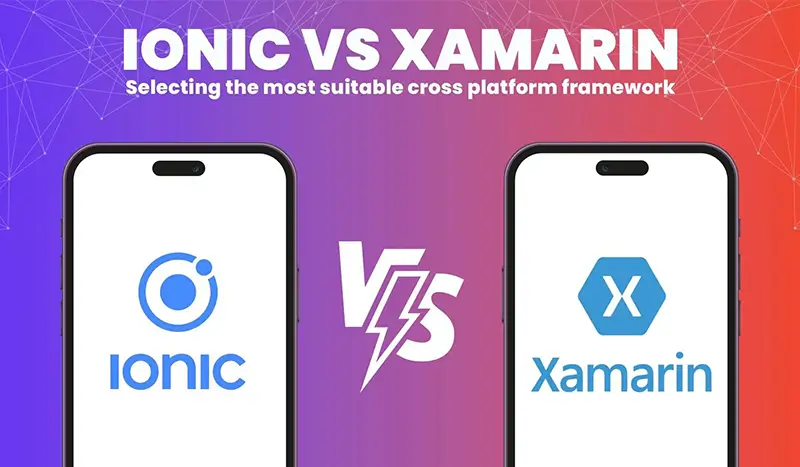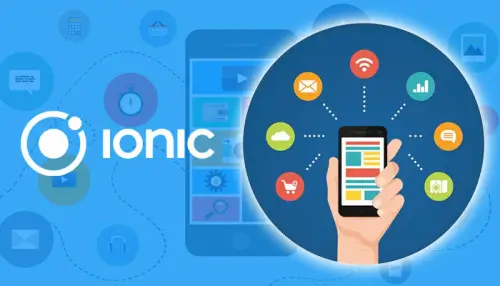In the corporate realm, effortless mobile app development using frameworks like Ionic and Xamarin holds pivotal importance. These platforms streamline the creation process, enabling rapid adaptation to market dynamics. Such simplicity accelerates time-to-market, enhances customer engagement, and optimizes operational efficiency. With Ionic and Xamarin’s user-friendly interfaces, businesses can efficiently craft cross-platform apps, ensuring they remain agile, competitive, and capable of delivering exceptional user experiences.
Ionic or Xamarin- A Brief Overview
Before diving into the nitty-gritty of Ionic vs Xamarin, let’s get a better understanding of what these frameworks bring to the table.
Ionic: Unleashing the Potential of Web Technologies
Ionic emerges as an open-source framework that melds the capabilities of HTML5, CSS3, and JavaScript to forge captivating cross-platform applications. By harnessing the power of the web stack, Ionic grants developers the ability to fabricate applications that transcend platform boundaries, all from a singular codebase. The framework is built atop Angular, a widely embraced JavaScript framework, and presents an array of pre-designed UI components that facilitate the creation of interfaces mirroring native experiences. This cohesive approach accelerates the development trajectory and upholds uniform user encounters across diverse devices.
Xamarin: Fusing Native and Cross-Platform Development
On the other hand, Xamarin adopts a distinct trajectory. Following its acquisition by Microsoft, Xamarin empowers developers to sculpt cross-platform applications using C# and the .NET framework. Xamarin’s unique differentiator lies in its capacity to share a substantial segment of code across assorted platforms, while still preserving the latitude to imbue platform-specific attributes. The framework empowers developers to forge authentic native journeys for iOS, Android, and even Windows platforms.
Ionic vs Xamarin
Now that we have a broad understanding of both frameworks, let’s delve into the showdown: Ionic vs Xamarin.
1. Development Experience
Ionic’s development experience is highly intuitive for those familiar with web technologies. The use of HTML, CSS, and JavaScript simplifies the learning curve, especially for frontend developers. Angular integration further enhances this experience by providing a robust structure for building complex applications.
Xamarin, with its C# and .NET background, appeals to developers with a Microsoft ecosystem background. For those already versed in C#, Xamarin offers a smoother transition to mobile development. However, developers new to C# might face a steeper learning curve.
2. Performance
When it comes to performance, Xamarin often takes the lead due to its ability to create native applications. Since Xamarin apps are compiled down to native code, they generally exhibit faster performance and smoother animations. This is particularly noticeable in scenarios where resource-intensive tasks are involved.
Ionic apps, while delivering satisfactory performance, may show some lag in comparison to Xamarin apps, especially when it comes to complex animations or interactions. However, Ionic has been continuously optimizing its performance, closing the gap over time.
3. Native Features and APIs
Xamarin shines in terms of native features and APIs. Since Xamarin applications can access platform-specific APIs directly, developers can harness the full capabilities of each platform. This is crucial when integrating advanced device functionalities, such as Bluetooth or custom camera interactions. Xamarin’s seamless integration with platform-specific APIs gives it a clear advantage in this department.
Ionic, being web-based, often relies on plugins to access native features. While the plugin ecosystem is extensive and rapidly growing, it might not cover every possible use case. This can result in some limitations when compared to Xamarin’s direct access to native APIs.
4. Community and Ecosystem
Both Ionic and Xamarin boast active communities and growing ecosystems. However, the edge might go to Ionic due to its web-based nature. The vast pool of web developers familiar with Ionic’s core technologies makes it easier to find skilled resources for your projects. Additionally, Ionic’s vibrant community contributes to a wealth of tutorials, plugins, and solutions to common problems.
Questions remains still: Xamarin or Ionic
Ultimately, the choice between Xamarin and Ionic boils down to your project’s requirements, your development team’s skill set, and the desired user experience. Xamarin becomes the ideal choice when extensive use of platform-specific features is necessary, coupled with a proficient team in C# and .NET development, and the goal of achieving an authentic native user experience across all platforms. On the other hand, Ionic is suitable for teams that excels in web technologies such as HTML, CSS, and JavaScript, aiming to effortlessly address multiple platforms. Additionally, if prioritizing an expansive community and diverse range of plugins and resources is key, Ionic emerges as the preferable option.
Ionic vs Xamarin vs React Native: A Triangle of Options
Before wrapping up, it’s important to highlight React Native as a third player in the realm of cross-platform development. Developed by Facebook, React Native occupies a middle ground between Ionic’s web-centric approach and Xamarin’s native strengths. By utilizing JavaScript and React, it crafts applications resembling native experiences. This strikes a harmonious equilibrium between performance and development simplicity, making React Native a compelling choice for those seeking the best of both worlds.
In the end, the choice between Ionic, Xamarin, and React Native depends on the project’s specific needs and the expertise of your development team.
Conclusion
To be precise, the Ionic vs Xamarin comparison defies a universal solution. Decisions must align with team familiarity, app performance needs, and reliance on native attributes. Recognizing the merits and vibrant communities of both frameworks is key. Whether opting for Ionic’s web approach or Xamarin’s native strength, the chosen direction will profoundly shape cross-platform app development.
At Oditek, we provide the expertise and support you need to navigate this important decision. Whether you’re considering Ionic’s streamlined web-based approach or Xamarin’s native capabilities, partnering with us ensures a well-informed and successful cross-platform app development journey.







